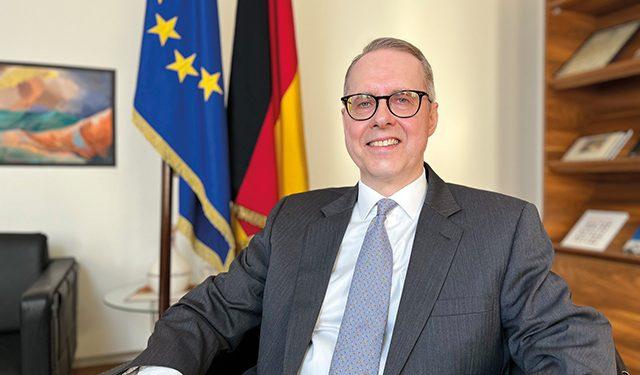In a recent statement underscoring the importance of regional stability, the German ambassador to Korea urged both North and South Korea to exercise restraint and avoid actions that could escalate tensions. Speaking amidst ongoing uncertainties on the Korean Peninsula, the ambassador called for a reduction in belligerent rhetoric and emphasized the necessity of dialogue to maintain peace. This appeal highlights growing international concern over the volatile situation and the critical need for diplomatic engagement between the two Koreas.
German Ambassador Urges Diplomatic Dialogue to De-escalate Tensions on Korean Peninsula
Germany’s top diplomat in Seoul has called on the governments of North and South Korea to seek meaningful engagement rather than military posturing. Emphasizing the urgent need for de-escalation, the ambassador stressed that sustained diplomatic dialogue remains the most viable path to regional stability. He highlighted the shared responsibility of both nations to “avoid war and be less belligerent”, noting the devastating human and economic consequences a conflict would unleash not only locally but across Northeast Asia.
The ambassador outlined key areas where mutual cooperation could pave the way for normalized relations, including cultural exchanges, joint economic projects, and security mechanisms to prevent accidental clashes. He urged the international community to support these efforts through constructive dialogue and incentives rather than sanctions and isolation, which risk exacerbating tensions. The statement aligns with Germany’s broader commitment to peace-building initiatives and multilateral diplomacy in conflict zones worldwide.
- Promotion of sustained inter-Korean talks
- Encouragement of humanitarian cooperation
- Support for multilateral security frameworks
| Initiative | Potential Impact |
|---|---|
| Economic Cooperation Zones | Boost cross-border trade and employment |
| Humanitarian Aid Collaboration | Address urgent healthcare and food needs |
| Security Confidence-Building Measures | Reduce risk of military escalations |
Calls for Mutual Restraint as a Crucial Step Toward Peace and Stability
The German ambassador to South Korea underscored the urgent need for both North and South Korea to demonstrate mutual restraint amid escalating tensions on the peninsula. Emphasizing dialogue over confrontation, the envoy called on leaders from both sides to “avoid war, be less belligerent,” and take concrete steps toward reducing hostile rhetoric and military provocations. This approach, he argued, is essential to fostering a more stable security environment and opening pathways for meaningful peace negotiations.
Highlighting recent developments, the ambassador acknowledged the complex geopolitical challenges but stressed that constructive engagement and measured responses remain the best tools to prevent conflict. He encouraged:
- Reduction of military drills near the Demilitarized Zone (DMZ)
- Resumption of inter-Korean dialogue channels
- Increased diplomatic efforts involving regional partners
| Key Areas of Mutual Restraint | Expected Outcome |
|---|---|
| Ceasefire Agreements | Lower risk of accidental clashes |
| De-escalation of Rhetoric | Improve trust and communication |
| Joint Economic Projects | Build interdependence and cooperation |
Recommendations for Confidence-building Measures and Continued International Engagement
To foster a sustainable peace process, the ambassador emphasized the necessity of incremental confidence-building measures that encourage dialogue and reduce tensions. Key steps include reinstating direct communication channels between the Koreas, resuming humanitarian aid projects, and organizing joint cultural or sporting events to enhance mutual understanding. These measures can create a foundation of trust and demonstrate each side’s commitment to de-escalation without formal binding agreements.
Continued international engagement remains critical in maintaining momentum towards reconciliation. The ambassador called on regional powers and global institutions to facilitate consistent diplomatic exchanges, promote transparency regarding military activities, and support multilateral frameworks that can buffer unilateral provocations. Below is a simplified overview of recommended actions to sustain this cooperative atmosphere:
| Measure | Purpose | Expected Outcome |
|---|---|---|
| Reopen Military Hotlines | Prevent misunderstandings and accidental escalations | Reduced risk of conflict |
| Joint Cultural Exchanges | Build interpersonal rapport and normalize relations | Improved public sentiment |
| Regular Diplomatic Summits | Maintain open communication and negotiate issues | Ongoing dialogue facilitation |
| Third-party Mediation | Impartial facilitation of disputes | Reduced bias and increased trust |
To Wrap It Up
As tensions continue to simmer on the Korean Peninsula, the German ambassador’s call for restraint and dialogue underscores the urgent need for de-escalation between North and South Korea. His appeal for both nations to avoid war and reduce belligerence echoes the broader international community’s hopes for lasting peace and stability in the region. Observers will be watching closely to see whether these diplomatic efforts can pave the way for renewed engagement and a reduction in hostilities.




